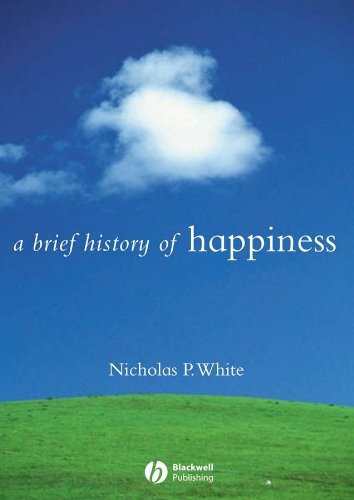

Full description not available
C**R
Heat without light
I really wanted to like this book, but it was a struggle to finish and I came away feeling disappointed.First of all, this book isn't really "a brief history of happiness." Rather, it's an exploration of what Western philosophers have had to say about happiness, especially ancient Greeks and Romans. This limitation of course leaves a lot out, including both non-Western philosophy as well as ideas from outside of philosophy, so I think the book's title overpromises and is misleading.My second complaint is that White's writing style is repetitive and unnecessarily overcomplicates matters, and thus demonstrates why so many people who search for wisdom are turned off by academic philosophy, especially the analytic approach which is evident in this book.My third and most important complaint is that White's conclusion is anti-climactic and ultimately unhelpful, and thus reading the book turns out to be largely a waste of time. If I understand him correctly, his conclusion is that Western philosophers have been unable to propose an understanding of the concept of happiness which could gain even a smidgen of consensus, and thus there has also been no consensus on how the happiness of a life should be evaluated, nor how happiness can best be attained. This raises the question of whether "happiness" is even a reasonable goal, given the apparent conflicts between the plurality and incommensurability of our various aims, intrapsychic harmony versus creative tension, tranquility/indifference versus engagement/attachment, contemplation (theory) versus action (practice), moment-to-moment versus time-aggregated happiness, happiness versus morality/virtue, and happiness of one person versus another.In other words, the implication of White's conclusion is that happiness eludes us because we're simultaneously being pushed and pulled in many directions, and we have no reliable criteria with which we can decide which way to go. This means that what we're really wrestling with is the question of the meaning and purpose of our lives. Other than very briefly touching on a few Christian perspectives, White is essentially silent on this underlying and all-important question, so the book ultimately fails to get to the heart of the matter.Maybe I can best sum up the book by quoting White himself (p. 15): "Philosophers' concrete advice about how to become happy isn't any better (in fact, it's probably worse) than that of the average person." That conclusion may not apply to all philosophers, but it certainly applies to this book.
A**E
Provocative and illuminating analysis
This is a very interesting and challenging review of the philosophical concept of happiness. Not only is it a "brief history" of the concept as it has been used and explored by Western philosophers, but also it is a provocative and illuminating analysis of the coherence and usefulness (or lack thereof) of the concept. Readers should be aware that this is decidedly not a self-help book, and it does not purport to give advice on the meaning of life or an assessment of which of the many conceptions of happiness is best for a well-lived life. It also does not canvass the uses and discussion of the concept that one might find in Maslow or in today's "positive psychology" literature. Rather, it explores the concept and the uses and criticisms of the concept by philosophers such as Plato, Aristotle, the Stoics, Epicureans, Skeptics, Kant, Scottish Enlightenment philosophers, and Utilitarians, among many others. (The heavy representation of Ancient Greek and Hellenistic philosophers in the book reflects Professor White's academic specialty. He has written important works on Plato, Aristotle, and the Hellenistic philosophers.) Readers also should be aware that this is a challenging and intellectually demanding book. It probably would be helpful to have had some exposure to ancient philosophy and some of the other philosophers discussed in the book. It definitely is not a book for the beach! But it is well worth the effort and attention it requires. Because it is so short (coming in at about 175 pages of text), there are a lot of discussions that could have been amplified somewhat. I certainly would have liked to see a more detailed discussion of Professor White's view about the right way to read Aristotle's Ethics and how to reconcile the position of Aristotle that he emphasizes with other things that Aristotle says about the usefulness of theorizing on ethics. And I would have liked to see a discussion of why it makes sense to assume that the Greek discussion of eudaimonia actually is a discussion of what we call "happiness" at all. But that the book does not do all that might be desirable does not mean that it is not a very good, very provocative starting place for rethinking the concept of happiness and its role in our thought and deliberations about a good life.
P**M
excellent
excellent